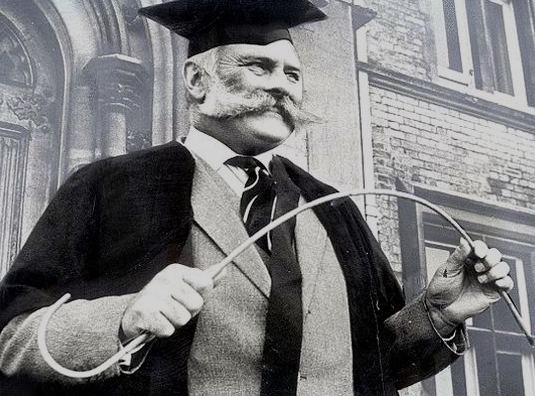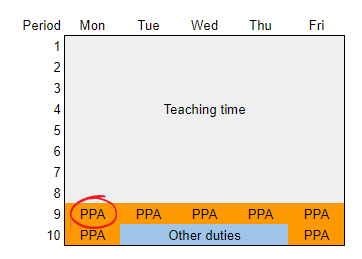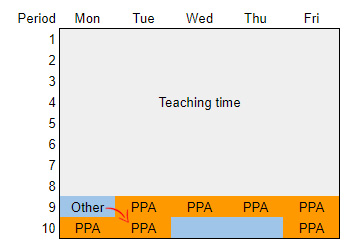Many teachers think directed time is the time they are asked to spend on the school premises after students have left. Staff meetings, departmental time, twilight moderation, etc, are often thought of as staff directed time. But this is not the case:
“Directed Time means time spent on any activity which the Principal has determined that a teacher shall undertake.”
Education Authority Guidance on Directed Time Budgets

Practically this refers to the Professional Duties of a teacher, which are detailed here. Note – the Principal can ask teachers to do other reasonable tasks as part of their directed time, so the list isn’t the Ten Commandments of teaching duties. That said, it’s not a card collection game either, and no teacher can be expected to do all the tasks in their day to day duties.
The directed time expectations for each teacher have to be laid out in a time budget, which should be individual to each member of staff, discussed and agreed with that teacher, and given out prior to the first teaching day.
All of the 1265 contracted hours that a teacher is required to be on the premises (minus lunch) must be accounted for within the directed time budget.
NASUWT guidance
Directed Time budgets are famously complex, simply because the nature of teaching is so complicated and varied. But the essence of them is actually very simple:
1. The Principal directs a staff member to do something.
This is the “direction” in “directed time.” It can be very specific (e.g. attend parents’ evening on the 10th of October) or quite broad (e.g. teaching this year.)
The direction, however, cannot be non-specific: e.g. a few hundred hours of “other Professional duties” is not acceptable, and Principals cannot use holding directions such as “to be assigned during the year” to push back the planning to a later date. The directions on the DTB should provide evidence of careful planning from the Principal in advance of the school year starting. It is their professional duty to do so.

Additionally directions should be individualised for the teacher, and in line with the school development plan. Ultimately a direction should benefit learners, as part of the purpose of DTBs is to help Principals carefully select what tasks are best suited to the professional skills of the teaching staff. They’re about getting maximum value for money from teachers, by getting maximum value for learners out of the 1265 hours.
2. The Principal assigns a time to that direction.
A direction without sufficient time to carry out the directed task is useless. As a result, Principals must ensure that sufficient time is provided in the time budget for staff members to reasonably achieve the direction. This is where consultation with staff is vital: staff members will be able to provide evidence of how long a particular task takes, and no Principal can know every aspect of the work their staff do.
This is one of the key issues why DTBs are currently not working properly. The time given to fulfil tasks is generally underestimated, in particular for things such as pastoral roles, marking, moderation, communications and reporting. Teachers and Principals are both regularly overly optimistic about how long a task might take.

Some of the timings for directions can be calculated using our online calculators in the tools section of the site.
3. The Directed Time is assigned a slot in real life by the teacher.
One of the key problems think1265 have discovered with making DTBs work properly, is the issue of assigning planned time to an actual slot of time in the calendar. Apart from global things such as teaching time and meetings, many individual directions can end up not being given actual time during the working week. Therefore it’s up to teachers to ensure that they select blocks of time for various directed tasks week by week, and to keep some form of tally of how their DTB is working out. Teachers will also need to move this time around if things change during a week.
To use an overly simplified example, let’s say a teacher has 10 non-contact 30 minute periods, two each day. Seven of those are assigned as PPA time, so the teacher chooses to do 2 periods Monday and Friday, and 1 period PPA Tuesday – Thursday.

Initially their timetable looks like this.

But on Monday morning they have to do a meeting with a parent p9, which is part of their other DTB duties. So they need to remember to move their PPA period to the next free slot, otherwise they lose the time on the DTB.

Ultimately this is up to the teacher to track, otherwise DTB mission-creep will set in and that PPA time will never actually take place in the 1265 hours. But the classes still need planned for, so what will the teacher be forced to do? That’s right – they’ll take the planning home with them, and the workload begins to blossom once again.
4. Directed Time budgets should be monitored and reviewed
Finally comes another step which we typically ignore, but which is vital to getting the entire idea of DTBs functioning properly. By tracking how time plays out in the real world (step 3), it is then possible to have intelligent and evidence-based discussions about how the DTB assigned to a member of staff is working out.
Jordanstown and subsequent workload agreements are crystal clear: (teacher) “workloads will be such that contractual duties will normally be completed within contractual hours.” (TNC 2024/2)

This means that DTBs should be so well planned that the directions from the Principal to the teacher should all be able to be completed within the 1265 hours each year. If a staff member is exhausting hours because tasks are taking longer than planned, or because they’re being overloaded with tasks that are not on the DTB, then something needs to be changed about the Directed Time planning.
While it is the responsibility of the Principal to ensure that DTBs are done and are fit for purpose, and while it is also their responsibility if a member of staff “runs out of hours” during the year*, a Principal cannot know how well their DTBs are doing if staff members don’t keep a track of their hours and report back to the Principal.
Therefore all of us – school leaders, middle managers, and teachers – need to change our attitude toward Directed Time, and begin to adopt a collaborative and open approach to getting DTBs right.
Proper directions given proper time = a proper Directed Time Budget.
* Should a member of staff “run out” of hours during an academic year, school leaders will either have to employ substitute teachers to complete their work that year, or engage that member of staff in overtime payments from the moment their 1265 hours ran out. Principals are warned time and time again about this in the DTB training.
Summer break in:
(Note – you’re not paid for summer holidays, so leave your work on your desk.)
Designed and produced by teachers and trade unionists. While every effort has been made to ensure the accuracy of information on this site, teacher and union representatives are advised to contact their own trade union reps before taking action which might leave them in breach of contract. Think1265 uses WordPress, which uses cookies for functionality. Think1265 does not use any cookies for any purpose other than those used by WordPress for site functionality, and no personal information is retained or processed by think1265 without users’ specific permission. © 2025 think1265
